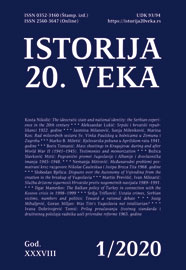THE IDEOCRATIC STATE AND NATIONAL IDENTITY: THE SERBIAN EXPERIENCE IN THE 20TH CENTURY
THE IDEOCRATIC STATE AND NATIONAL IDENTITY: THE SERBIAN EXPERIENCE IN THE 20TH CENTURY
Author(s): Kosta NikolićSubject(s): Ethnohistory, Recent History (1900 till today), Politics and Identity, Peace and Conflict Studies
Published by: Institut za savremenu istoriju, Beograd
Keywords: The Balkans; South Slavs; Serbian Nation; Identity; Religion; Ideocracy; Ethnic Conflicts; Disintegration;
Summary/Abstract: Since the end of the second decade of the 21st century the Serbian people have been living on the ruins of Yugoslavia. In this country, formed over a century ago, the Serbs were united for the first time in their history, yet they gambled it away. How did this happen? While some interpretations emphasize the role of individuals, others give prevalence to structural elements. As a potential link between the two, this paper examines the influence different ideologies had on the creation of the Serbian identity in the 20th century and scrutinizes the role of these ideocratic tendencies in the process of nation building and state formation, as well as its integration and disintegration.
Journal: Istorija 20. veka
- Issue Year: 2020
- Issue No: 1
- Page Range: 9-34
- Page Count: 26
- Language: English

